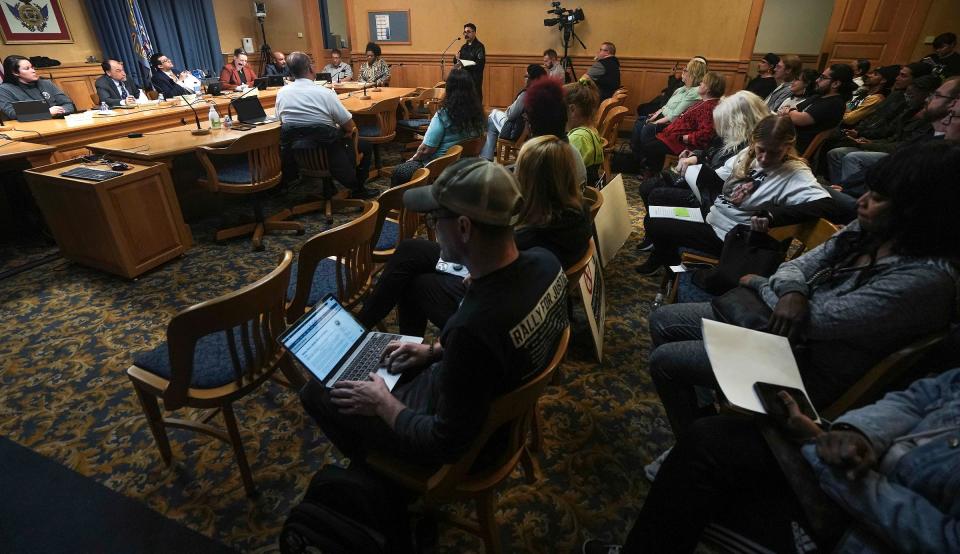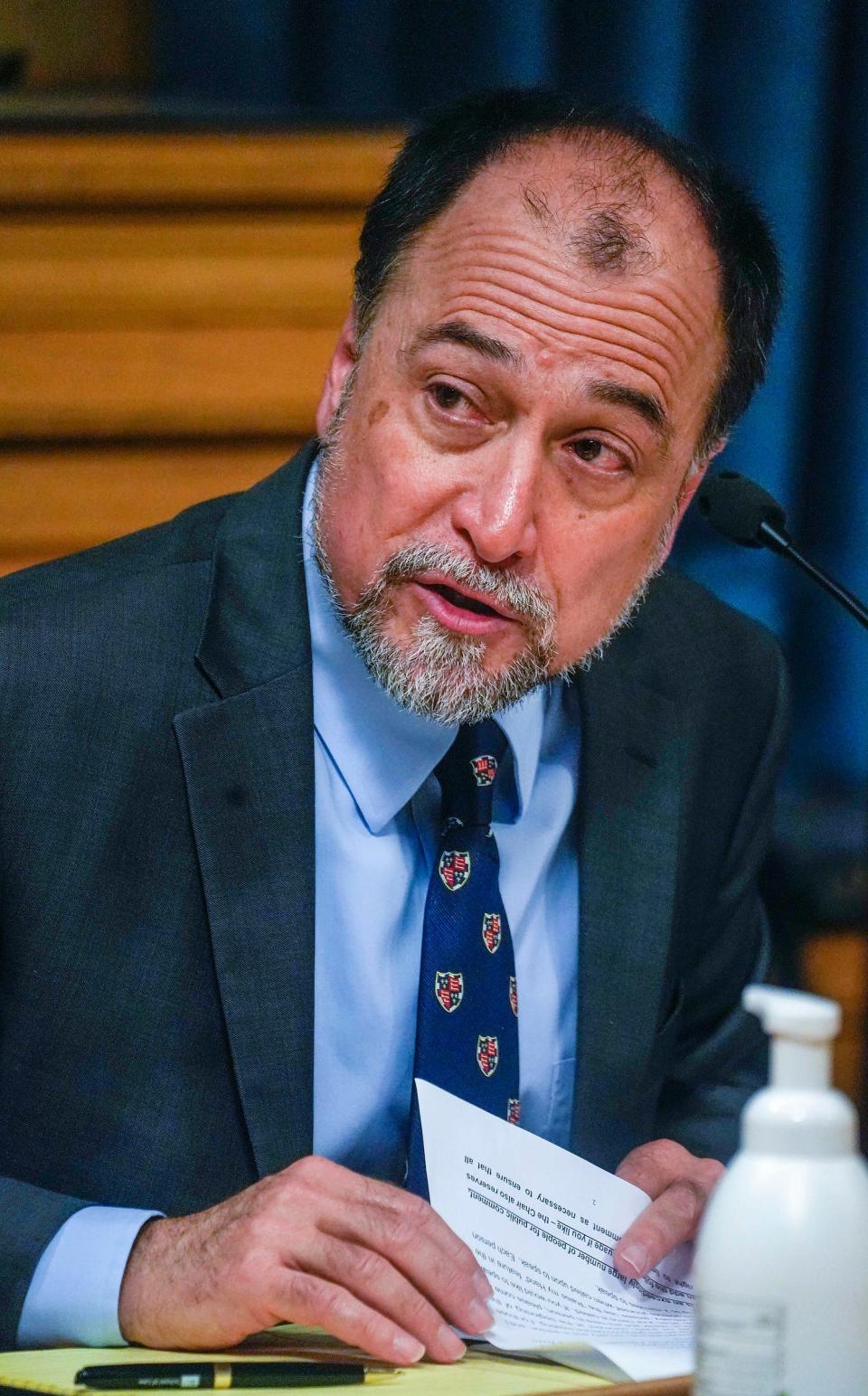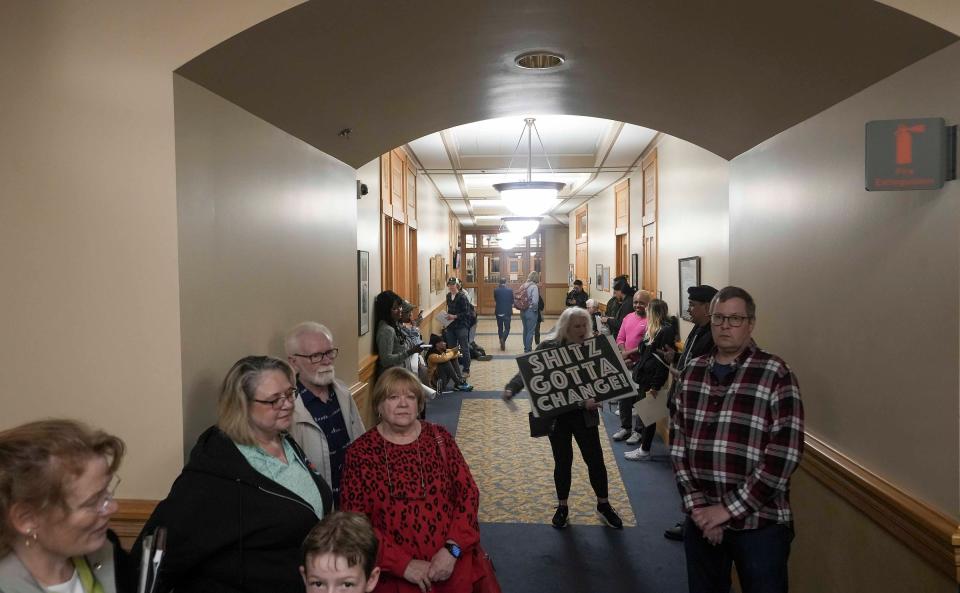Police oversight board approves 15-day policy for releasing body camera footage
Milwaukee’s police oversight board on Thursday unanimously approved a policy requiring footage of fatal police shootings and other similar incidents to be released publicly after 15 days, becoming one of the few agencies in the nation to have such a policy.
The policy also allows family of those hurt or killed by police the opportunity to view footage within 48 hours. It does not give police any chance at extending either deadline.
The move – driven by the work of community activists – was hailed by members of the Fire and Police Commission and residents who attended Thursday’s meeting as a victory for transparency on an issue that has played a huge role in community mistrust in law enforcement. It comes after more than a year of information gathering and debate on the subject.
“This is a major step forward for the city of Milwaukee,” said Chairman Ed Fallone said after the vote. “Citizen oversight of police and public safety works.”

The policy applies to what are commonly referred to as “critical incidents” – police shootings, in-custody deaths or other officer-involved events where someone is killed or seriously injured. It is set to take effect May 1.
It will accelerate the release of such footage in Milwaukee by a month at minimum. Milwaukee police previously operated under a goal-oriented process of releasing footage in 45 days – which was not always met.
It will not, however, result in the names of officers involved in critical incidents to be released any sooner than they are now – after a review of the investigation is completed by the Milwaukee County District Attorney’s Office.
The policy is not exactly reflective of what activists had called for ad nauseum – releasing names of officers in 24 hours and the footage publicly in 48 hours – during the last 14 months.
But the move – in particular the decision not to grant police a chance at extending deadlines – was met with a burst of joy from around 50 members of the public that packed into the meeting room at City Hall.
“I think it’s a much stronger policy,” said Alan Chavoya, a member of the Milwaukee Alliance Against Racist and Political Repression, which pushed the commission to take up the issue in early 2022. “It builds trust. It’s not perfect. Fifteen days is a long time, but it goes a long way.”
Milwaukee police administration accepts decision; union files for injunction
Police did not attend the meeting in person and made no statement after the vote.
Officials had gently pushed back on the policy for months, favoring instead to codify its 45-day timeline in the interest of maintaining investigation integrity and to release footage with additional contextual information.
However, Police Chief Jeffrey Norman repeated Thursday the department would accept whatever the Fire and Police Commission decided. Fallone has continuously praised Norman for his cooperation and help during the 14-month process that led to Thursday’s decision.
“In my opinion Chief Norman is a clear break from our past with police chiefs in the city of Milwaukee,” Fallone said.

However, the Milwaukee Police Association, the union representing rank-and-file officers, filed for a temporary injunction in Milwaukee County Circuit Court that would halt the policy from taking effect.
In a statement Friday, union President Andrew Wagner said the commission disregarded the concerns of other area law enforcement professionals about the complications such a policy could create for investigating critical incidents. He also accused commissioners of overstepping their authority and violating the union’s contact with the city.
“The FPC has not considered the irreparable harm that will come to a police officer, in the absence of a fair and unpressured investigation, free from being judged in the court of public opinion,” Wagner said. “They failed to consider in almost all of these situations the police officer is the victim and is guaranteed privacy protections.”
How exactly members of the Milwaukee Area Investigative Team, or MAIT – a collection of area police departments that step in as outside investigators for critical incidents – will react to the policy was unclear Thursday.
Members of MAIT had previously threatened to stop investigating critical incidents in the city if footage was to be released to anyone after 48 hours. Their refusal would have a significant negative impact on how Milwaukee police are investigated for such incidents.
But a MAIT official – Oak Creek Police Chief David Stecker – declined to make a comment at Thursday’s meeting, and the commission did not fret over any risk.
Fallone said after the meeting he did not anticipate any issues.
Commission debates provision for extending deadline
The only provision that received extended debate Thursday was whether to allow police an avenue to extend the 15-day deadline for a set list of reasons. The commission voted 5-3 to remove that provision to cheers from the public.
Those in favor of an extension stated a wariness about not allowing any flexibility during what can be a complicated investigation, which by state law must be led by an outside police agency. Few police agencies have video release policies on the book, and the cited an unproven track record with hard deadlines.
Several commissioners in opposition stated a confidence in Norman as chief, but worried about potential abuse from future administrations. Others argued it would set a new tone for transparency.
Throughout the last 14 months, family members of those killed by police spoke about their difficulty finding answers in the months that followed. Several commissioners cited that testimony as part of their decision-making.

“This is an opportunity to set an important precedent that transparency is a central concern of the Fire and Police Commission, it is a central concern of the Milwaukee Police Department and it is responsive to what is clearly a central concern of the community,” Commissioner Bree Spencer said.
Despite the disagreement on that issue, the full commission appeared excited by the policy that passed.
“That concludes the agenda,” Executive Director Leon Todd said as the evening concluded. “Good meeting.”
Contact Elliot Hughes at [email protected] or 414-704-8958. Follow him on Twitter @elliothughes12.
Our subscribers make this reporting possible. Please consider supporting local journalism by subscribing to the Journal Sentinel at jsonline.com/deal.
DOWNLOAD THE APP: Get the latest news, sports and more
This article originally appeared on Milwaukee Journal Sentinel: Milwaukee's police oversight approves 15-day body camera release policy
